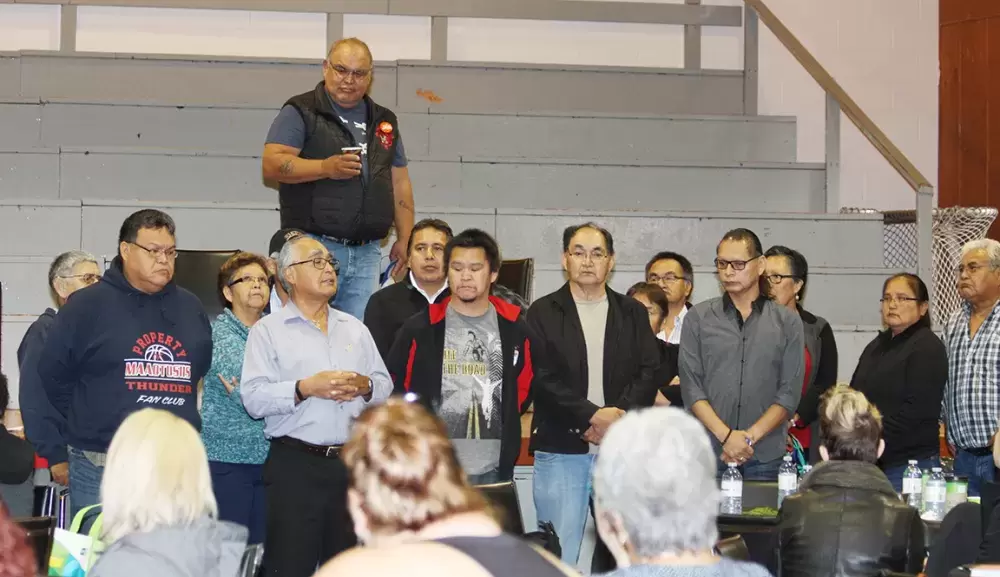People concerned about child welfare gathered at Maht Mahs Sept. 29 and Sept. 30 to explore ways in which to better meet the needs of Nuu-chah-nulth families and children.
T`at`atnaaluk – Taking Care of the Children forum, hosted by the Nuu-chah-nulth Tribal Council, was open to everyone and included many Nuu-chah-nulth chiefs and councils, Ha’wiih, social workers, Usma and Nuu-chah-nulth Tribal Council staff. Also in attendance were community members, foster parents, children in care, youth, and elders.
The NTC directors and executive were looking to these people to contribute their thoughts and experiences in how best to strengthen Usma’s connection to Nuu-chah-nulth communities, values and principles.
Emcee John Rampanen welcomed the people and introduced John Gomez who officially welcomed the people to Tseshaht territory.
“You’re here to do some important work; to look at Usma and how we’ve done things in the past and how we can move forward in a healthy way,” said Gomez. He asked the people to remember to stay focused on the objective – the children.
Cliff Atleo Sr. of Ahousaht was asked to open the event, with a prayer. He urged people to return to the old teachings. He reminded people that Nuu-chah-nulth-aht had ways to take care of family issues. “We shouldn’t be having these problems,” he said.
As the forum started, the delegation from Ahousaht stood to share a message from their Tyee Maquinna. “Our head chief wants us to stand up and make a statement about how important this is,” said Atleo. “He asked us to be open to participate, listen and find solutions to get us back to that place we were before contact,” he continued.
Rampanen said he is actively working to learn the Nuu-chah-nulth language and in doing so is picking up important Nuu-chah-nulth teachings. “One of my favorite teachings is when we wake our children in the morning, the first thing they should hear is, ‘I love you’ and they are precious,” he shared.
He told the gathering that the two-day forum was about having a dialogue to share what is most important to the people so that they can come up with an action plan.
NTC President Deb Foxcroft talked about the beginnings of Usma. “Back in the early 80s, I was the Social Development Coordinator for the tribal council, and in those days we’d get up to 500 people attending an AGM,” she recalled.
A comprehensive study was carried out that focused on the health care needs of Nuu-chah-nulth people; and in that study it included the vision to take over our child welfare services. One of the things that our people wanted was to take care of our own children, because in those days we lost numerous children to the foster care system and through adoption.
At one of those AGM’s, tribal council staff were directed by the people to work toward having our own health and welfare systems. NTC leadership and staff began working toward the transfer of services from the governments of the day.
In 1987, the Nuu-chah-nulth Tribal Council signed the first delegated child welfare agreement in British Columbia. In the beginning, Foxcroft said, there was more autonomy, funding for community development and prevention services and the program had an elders’ advisory committee and a genealogy worker to help foster kids connect with families.
But as the years went by, the funding started to shrink. “We had the autonomy to develop our programs and services based more on our traditional teachings and values. Since that time, there have been funding cuts and more government controls and pressure on how we could develop and practice,” she said.
“It hasn’t been an easy road,” said Foxcroft. The legacy of residential schools and other things has done damage to first nations families and the traditional family structure. Even today we are still dealing with alcohol and drugs, family violence and sexual abuse; but more people are speaking out and are healing, and rebuilding and strengthening their families, said Foxcroft. Progress has been made over the past 30 years, and while those things are still affecting families there has been a lot of healing.
“With our values, our teachings and our families, we are strong, but we need to take responsibility to ensure our children are safe, healthy and happy and we do that by healing ourselves,” said Foxcroft. “I am proud to say that our people have led the way in dealing with all of these difficult issues,” she added.
Simon Read gave an overview of Usma’s mandate and financial hurdles over the decades. It was in 1985 that Usma received delegated child welfare authority from the government and in 1989 Indian Affairs set up a national funding formula.
“Some portions of that budget haven’t changed since 1989, even though costs have risen,” said Read.
“The feds are more focused on saving money rather than providing services and B.C. is similar. They put us through a special audit last year which vindicated NTC and allowed us to keep the money they tried to take away,” Read said.







